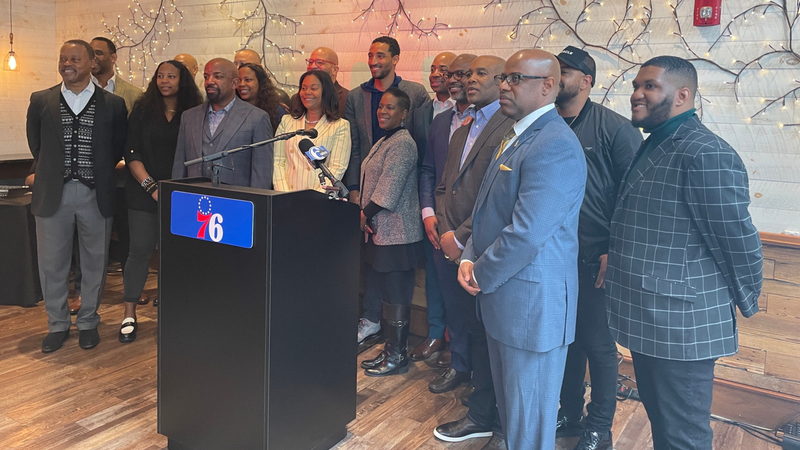
PHILADELPHIA (KYW Newsradio) — Citing the economic benefits that minority-owned businesses will see, Black business leaders and clergy stood with the African American Chamber of Commerce and the Philadelphia 76ers in their support of a proposed Center City arena.
David Gould, chief diversity and impact officer for the 76ers, announced the creation of a $2 million fund to support Black business in that effort.
"We know that to operate in a venue such as an arena is very unique, you know, there aren't a lot of Black-owned businesses that have that type of experience," Gould said.
Meanwhile opposition for the arena to be built on Market Street between 10th and 11th streets has grown. In fact, the Philadelphia Chinatown Development Corporation announced their opposition to the arena just last week, citing an overall negative impact on quality of life and existing businesses in the area.
Gould said the conversations to hash out ongoing concerns will continue.
“We're very willing to, and looking forward to, putting forth a plan for how we can invest in this surrounding community to make sure that it's a net benefit for everybody as well. We know that there's a lot of concerns about the project in Chinatown, but today is really about the city as a whole,” he said.
Regina Hairston, president of AACC, says this united support of the arena is really about Black businesses having a seat at the table and an opportunity to get in on the ground level where opportunities abound.
“A project of this magnitude and skill is going to allow so many diverse businesses, particularly Black businesses, to have an opportunity that they would not otherwise have,” said Hairston. “Our community generates $835 billion in spending in the U.S. economy alone. We are vital to the economy and must always be at the table. As a city, as a community, we must think creatively and intentionally in order to grow our diverse business communities.”
The initiatives and partnerships announced Thursday focus on preparing Black residents and businesses to benefit from the project, called 76 Place at Market East, as part of a larger effort to ensure the proposed arena is a win for Philadelphia and underrepresented businesses across the city.
Details of the initiatives unveiled include:
—Ensuring that food and beverage businesses at 76 Place reflect the racial diversity of the city, with the goal of 40% of such businesses being Black-owned.
—Creating a $2 million fund to help prepare and scale Black-owned businesses to become vendors, suppliers and concessionaires at 76 Place.
—Supporting efforts to build a community of Black talent and contractors, so that by the time 76 Place breaks ground, there are more Black workers from Philadelphia communities with the capacity, experience and preparation to work on the project — as represented by the 76ers’ role as a founding funder and board member of the Everybody Builds partnership between the Urban Affairs Coalition, large scale developers and institutions, contractors, and labor leaders.
"As a pastor and a leader in the city of Philadelphia, it is my belief that this project will serve as an extraordinary catalyst for the economic development of our city,” said Pastor Lonnie Herndon of the Church of Christian Compassion. “The versatility of a state-of-the-art facility has the potential to not only revitalize the Center City business district, but can also bridge the gap between Philadelphia and the surrounding counties.”
The privately funded arena is anticipated to cost approximately $1.3 billion. It’s projected to provide $1.9 billion in overall economic output during construction and $400 million annually upon opening.


